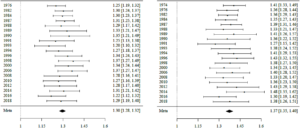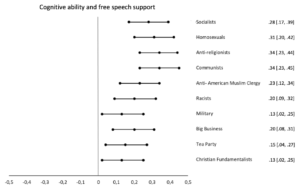Freedom of Speech: A Right for Everybody, or Only for Like-Minded People?
Freedom of speech is often considered key to a well-functional democracy. In many countries, freedom of speech is considered a more important democratic value than regular elections. But do people genuinely believe in the virtues of open debates by supporting freedom of speech for every social group? Or do they support free speech only for their own groups? In a recently published paper in Social Psychological and Personality Science, we aimed to answer these questions, and we sought to explore whether higher cognitive ability was associated with more principled positions on free speech. We expected that people with higher cognitive abilities would be more inclined to embrace the open exchange of ideas, wherein viewpoints can be scrutinized and challenged in order to foster informed decision making and knowledge. Therefore, it was hypothesized that cognitive ability is related to more generalized freedom of speech support for all social groups across the ideological spectrum.
In a first study, we analyzed 21 waves of data collected by the General Social Survey between 1974 and 2018. Results showed that individuals with higher cognitive ability were more in favor of free speech, a pattern that was stable across four decades of data collection. More precisely, higher scores on a cognitive ability test were related to supporting freedom of speech for all social groups included in the survey, representing a variety of ideological stances (e.g., socialists, militarists, racists, anti-religionists). Table 1 depicts the results for two exemplary groups at relatively opposite ends of the ideological spectrum (militarists and anti-religionists).
Table 1. The relationship between cognitive ability and freedom of speech support by year for militarists (left) and anti-religionists (right).

Note. Results represent odds ratio’s (OR). An OR < 1 indicates that higher levels of cognitive ability are related to weaker support for free speech, whereas OR > 1 indicates that higher levels of cognitive ability are related to stronger support for free speech. As depicted, the results show OR > 1 for all years.
In a second study, we examined the relationship between cognitive ability and freedom of speech support for a broader range of social groups. We also included a measure of affective prejudice towards these social groups and measured perceptions of these groups’ ideology. Consistent with previous research, higher cognitive ability was associated with liking ‘liberal’ groups (e.g., socialists, homosexuals, anti-religionists) and disliking ‘conservative’ groups (e.g., military, big business, tea party, Christian fundamentalists). Nevertheless, as in the first study, higher cognitive ability was related to more strongly endorsing free speech rights for all social groups. Hence, people with higher levels of cognitive ability more strongly support freedom of speech across the board, even for social groups they relatively dislike.
Table 2. The relationship between cognitive ability and freedom of speech support for various target groups in Study 2.

Note. Results represent correlations (r). An r < 0 indicates that higher levels of cognitive ability are related to weaker support for free speech, whereas an r > 0 indicates that higher levels of cognitive ability are related to stronger support for free speech. As depicted, the results show r > 0 for all groups.
In a third and final study, we again replicated the positive relationship between cognitive ability and supporting freedom of speech for all groups across the ideological spectrum. Moreover, in line with our pre-registered hypothesis, we found evidence that higher levels of Intellectual Humility could explain the relationship between cognitive ability and free speech support. In other words, those with higher cognitive ability might support principles of free speech because of their greater independence of intellect and ego, openness to revise their viewpoints, respect for others’ viewpoints, and lack of intellectual overconfidence.
The series of studies suggest that cognitive ability is related to support for freedom of speech for groups across the ideological spectrum. These results do not mean that people with higher cognitive abilities are free speech absolutists. Indeed, although cognitive ability was reliably related to relatively stronger free speech support for each social group, groups that preach hate and violence (e.g., racists, anti-American Muslim clergymen) received rather limited freedom of speech support in absolute terms. The results do suggest, however, that individuals with higher cognitive ability are more appreciative of the free flow of divergent ideas by groups at various places on the ideological spectrum. Indeed, even when these groups voice ideas that they don’t like.
Related Articles
Your generosity supports our non-partisan efforts to advance the principles of open inquiry, viewpoint diversity, and constructive disagreement to improve higher education and academic research.